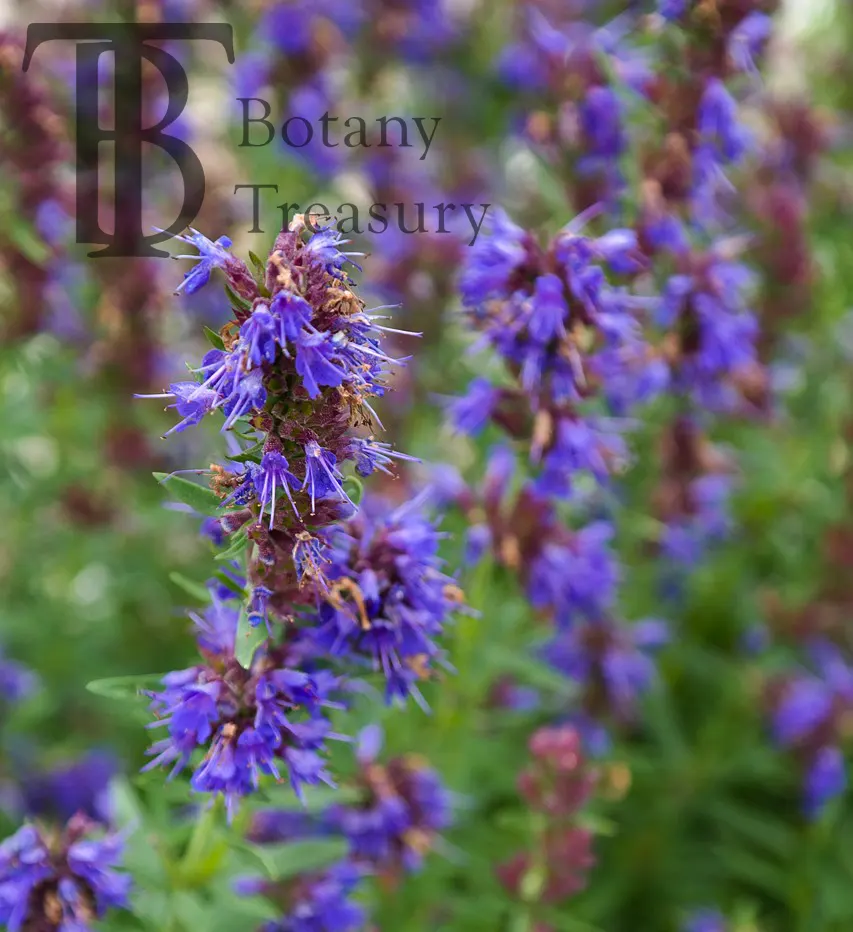
Hyssop
Hyssop (Hyssopus officinalis) is a perennial herb
native to the Mediterranean region, known for its distinctive, pungent flavor
and aroma. Belonging to the mint family, hyssop has been used for centuries in
various culinary, medicinal, and spiritual practices. Its leaves, stems, and
flowers are used to create teas, infusions, and other preparations that are
valued for their health benefits and unique flavor profile.
The active ingredients of hyssop include:
·
Pinocamphone: A terpenoid
compound responsible for the plant’s bitter and spicy flavor.
·
α and β-Pinene: Terpenoids
with antimicrobial and antioxidant properties.
·
Camphene: A sesquiterpene
with antimicrobial and antioxidant properties.
·
Sesquiterpene alcohol: A
compound with antimicrobial and antioxidant properties.
·
1,8-Cineole: A monoterpene
with antimicrobial and antioxidant properties.
·
β-Caryophyllene: A
sesquiterpene with antimicrobial and antioxidant properties.
·
Ursolic acid: A
triterpenoid with antioxidant and anti-inflammatory properties.
·
Diosmin: A flavonoid with
antioxidant and anti-inflammatory properties.
·
Apigenin
7-O-β-D-glucuronide: A flavonoid with antioxidant and anti-inflammatory
properties.
·
Myrtenyl acetate: A
compound with antimicrobial and antioxidant properties.
·
Germacrene: A sesquiterpene
with antimicrobial and antioxidant properties.
·
Spathulenol: A
sesquiterpene with antimicrobial and antioxidant properties.
·
Caryophyllen oxide: A
compound with antimicrobial and antioxidant properties.
These active ingredients contribute to the plant’s various
biological and pharmacological activities, including antimicrobial, antifungal,
antioxidant, and anti-inflammatory properties.
Here are some key health benefits of hyssop:
·
Antioxidant Properties:
Hyssop is rich in flavonoids, acting as antioxidants that can reduce the risk
of age-related conditions like cataracts, heart disease, and strokes. These
antioxidants also help lower the risk of cancer by removing free radicals that
can trigger cancerous cell growth.
·
Respiratory Support: Hyssop
has been traditionally used for respiratory benefits, with compounds like
camphor that possess expectorant properties, making it effective in managing
cough, congestion, and bronchitis.
·
Digestive Aid: Hyssop
stimulates digestion by increasing the production of digestive enzymes, stomach
acid, and bile, promoting healthy digestion and nutrient absorption. It can
also alleviate digestive issues and relieve cramps and flatulence.
·
Immune Support: Regular
consumption of hyssop preparations can strengthen the immune system, helping
the body defend against various infections.
·
Anti-Parasitic Properties:
Hyssop fights parasites like tapeworms, hookworms, fleas, and flukes, making it
a valuable component in parasite cleanses and aiding in maintaining overall
health.
·
Circulation and Skin
Health: Hyssop can increase circulation due to its anti-rheumatic properties,
benefiting the heart, muscles, and arteries. Additionally, hyssop oil’s
antiseptic properties make it effective in promoting skin health, including
treating acne and fighting infections.
·
These health benefits
highlight the diverse therapeutic properties of hyssop, making it a valuable
herb for overall well-being and specific health concerns.
Botany Treasury exports high-quality hyssop. If
you are interested in purchasing hyssop, please contact us.
